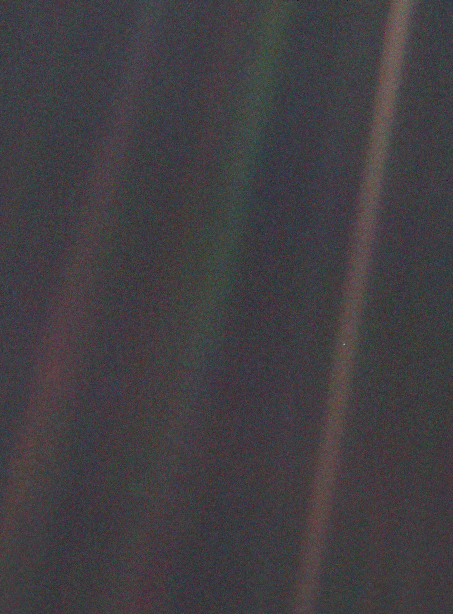The Rapidly Expanding Cosmic Flatulence
 Pale Blue Dot is a photograph of planet Earth taken on February 14, 1990, by the Voyager 1 space probe. Demonstrating how small our Earth is amidst the cosmos.
Pale Blue Dot is a photograph of planet Earth taken on February 14, 1990, by the Voyager 1 space probe. Demonstrating how small our Earth is amidst the cosmos.
At this day an age, as we are caught up in the process of depleting the precious potential of our minds and bodies—in the task our civilisation established that seeks to maintain prevalence amidst the chaotic realm of nature—we rarely look up to question: What can we, humans, offer to the Universe? Is there really anything that special in us—carbon-based life floating amidst 100-400 billion other solar systems in our Milky Way galaxy—which in turn, is a galaxy amidst another 2 trillion galaxies within the observable Universe. In other words (and numbers), what is so exciting about our living conditions that are to impress someone-somewhere among ~500’000’000’000’000’000’000’000’000 other solar systems? Nothing.
If you ever feel that your activities are futile and meaningless amidst the vastness of space, trust your intuition this time—for once it was not mistaken! But don’t remain preoccupied with it for long—there is enough space in the Universe to fill a wine glass of any size. It is numbers and turtles all the way down. Drink.
So where are we? Well, it depends what you mean by where. See, the human language evolved on this a small rock suspended in space, where everything is defined relatively to experiences and conditions that humans themselves have fabricated throughout the span of their history—while most of us, still struggle to distinguish left from right. But let that not be a sufficient dismissal of our capacities! We are able to define where we are relative to objects that surround us. We name these objects that we find according to an instrument of our semantic toolset—known as the human language. We use it to call things “Gay Street” or a stellar objects “MH782”. In other words, we know where we are relative to ideas that we ourselves fabricate. We also know that humanism is a good ground for moral values, but that would be a separate topic, perhaps, when wine permits to unravel one of the most remarkable products of human creation—fabricated ideas.
So where are we? Well, we might be somewhere in the outskirts of space, or, one might perhaps one day discover that we are part of a massive, rapidly expanding cosmic flatulence. But that doesn’t sound promising, does it? Well, to put things in perspective; parasites do not seem troubled of devouring mammalian guts; cancer does not seem troubled that it spreads through the tissue of its living bodies; and humans—who like their mould cousins—do not seem troubled to hang on thin strings of temporal stability. Mold might survive a major cataclysm, but nothing survives the chaotic forces of the rapidly expanding cosmic flatulence; where a supernova nova explosion of a star within several dozen light-years from Earth can potentially bleach our planet.
It seems like there is never a good answer to where are we, what are we, and what are we doing. But I welcome you to not give up your existential journey, for it is the greatest journey you could ever take within the span of this futile life, which you share with every other creature on Earth inhabit. Even birds and elephants are better existentialists than the majority of humans—at least they don’t seek to claim their bombastic prevalence amidst the stars.
Be an elephant, fly like a bird.